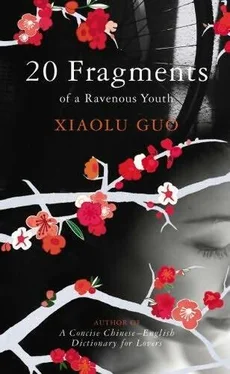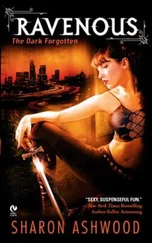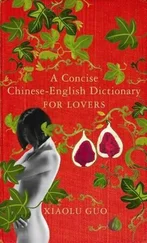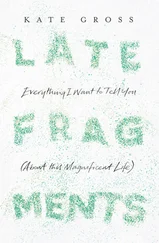When the taxi stopped at the dumpling restaurant, Huizi was sitting alone. Four huge plates of steaming dumplings filled the table in front of him. He was staring at the food like an idiot.
'Where's the Director? Didn't you say he wanted to choose actors with you?'
Huizi looked at me. 'He just left, literally a minute ago. I'm so sorry. He didn't even give me the payment he owed me for the script.'
What?' I couldn't believe my luck. I slumped into the empty seat across from Huizi. It was still warm.
'It's a complicated story,' said Huizi. We just ordered all these dumplings ten minutes ago. Then the Director's phone rang and it was his Producer. The Producer told him that their investor, some rich stock-market dude, got killed last night. Policemen said it was a murder. What happened was, the Producer went to collect the first instalment of money from this guy and found him dead on the floor. Blood everywhere. So now the Director has to go to the police station for questioning.'
Huizi lowered his head. 'It's probably a good thing. Now you won't waste your time with lousy people.'
I didn't know what to say. I leant over, picked up the clean chopsticks in front of me and reached out for a fennel dumpling. Heavenly Bastard in the Sky, there was a bottle of Eight Dragons Soy Sauce on the table. I couldn't believe my eyes. What sort of Director had been sitting here? Deep down, I'd always suspected there was a link between the high salt content in Eight Dragons Soy Sauce and Xiaolin's temper. Anyway, what the hell. I poured some of the damn soy sauce on to my plate, dipped the dumpling in it and swallowed without chewing. I was starving, and apparently I'd just lost my one opportunity to play a leading role. At least I could eat, eat as much as I could, eat until the world didn't owe me one penny.
After about 10 dumplings, I stopped feeling low. At least Huizi and I had each other to share this bizarre moment. At least I wasn't alone. I was thankful for that, Heavenly Bastard in the Sky.
Huizi sat back, watching me eat. I finished the whole plate of fennel dumplings, and started on the pork and chive ones.
'Fenfang, maybe this is a sign,' he said. 'Maybe you need to try something other than acting. You like reading. You know about films. Why don't you try to write a script? Seriously, if you could just finish a first draft, I'm sure I could help you to show it to people.'
'A first draft?' I looked at him, my mouth full of dumplings.
'Yes. Have you ever heard this: "Don't maul, don't suffer, don't groan – till the first draft is finished"?'
'Who said that?'
' Tennessee Williams.'
The dumpling stuck in my throat. ' Tennessee Williams? Who's that?'
'He's this American playwright who came from Mississippi, where there are loads of tornadoes during the summer. You know tornadoes?' Huizi asked. 'They're like typhoons, lots of crazy wind and wild rain. Anyway, he wrote a famous play called A Streetcar Named Desire.'
Desire? That was a weird name for a car. I imagined that Tennessee Williams was from some shiny world swept by dramatic winds.
Tornadoes, desire… these words excited me. Even though I'd never heard of Tennessee Williams, I clung to everything Huizi told me. I polished off the pork and chive dumplings, and felt encouraged.
'Huizi,' I said, 'you've got to be my best friend in the whole world. If everyone else on the planet died, I wouldn't give a shit. Even my mother. But if you died, I'd howl.'
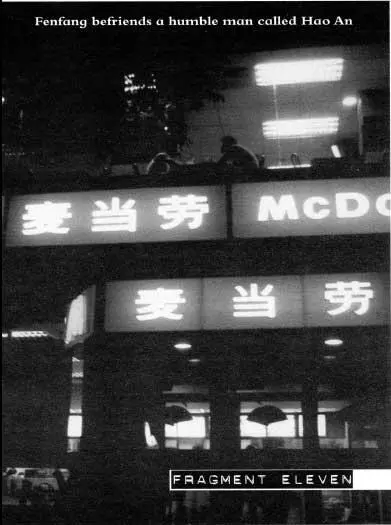
EVERYTHING AROUND ME WAS CHANGING SO fast – my apartment block, the local shops, the alleys, the roads, the subway lines. Beijing was moving forwards like an express train, but my life was going nowhere. Okay, so I was getting lots of work, but it was all the same. Woman Waiting on the Platform, Lady in Waiting, Bored Waitress. I was only in my twenties, but I felt 70. I had to do something, ask my brain to start working, so I could match this fast-moving city.
Inspired by Huizi, I started to watch nameless men and women in the street. We were alike: none of us heroes, just ordinary people – extras – drifting through messy streets in a vast, messy Beijing. One morning, I went for a walk along the rubble-filled roads near my building. The area was being completely reconstructed. Three or four giant trucks had just arrived to start their demolition. Old buildings were going. Entire streets were going. In just one night all the food stalls had disappeared, along with the men from the countryside who used to run them.
A man came to my mind. An ordinary man who had once moved through these empty streets. He could have had any name. I decided that he was called Hao An.
Hao An was nothing special to look at. Just an average nobody, unmemorable. The moment I thought of him, I felt like I'd heard about him before. I was sure he'd been mentioned in the scraps of gossip I picked up as I wandered around the neighbourhood. I started to write.
When I finally finished the story, I was nervous of showing it to Huizi. What if he thought it was a piece of shit? What if the producers he knew thought he was insane for trying to help such a fucking awful writer? Then I remembered the Assistant Director – the man with the pathetic yellow umbrella and the bible of useful names. He'd worked his way up through the ranks to become a prominent Second-Rate Director. Perhaps he would read my script. I gave him a call.
We met in Serve the People, the one on Electronics Street, because the Second-Rate Director wanted to eat Thai food. He looked different: fatter, with a ponytail and meticulously trimmed beard. Despite this, the pitiful red V-neck peasant sweater still peeped out from inside his jacket. Over pork and rice, I tried hard to sell the story of Hao An to the Second-Rate Director, but he didn't even let me finish. He shook his head and said this wasn't the kind of film people wanted to see. There was no moral, no uplifting message. Couldn't there be a mention of Red Army Day? Or National Tree Planting Day? Or China Aids Day? No? And what was he called – Hao An? Why such a boring name? Far too humble and unfashionable-sounding. My hero did absolutely nothing of value in the course of the story. He didn't represent the 21st-century Chinese. How could he, a Second-Rate Director, cast such a film? There was no way stars like Little Swallow, Su Youpeng or Xu Jinglei would be in something like this. It just wasn't modern enough. The Second-Rate Director repeated the word 'modern' in English, just to make his point.
I went back to my flat and lay down on my bed with all my clothes on. For two hours I didn't move. What had Huizi been thinking? There was no way I could write a script if I had no idea what would pull in an audience. From the way the Second-Rate Director had talked, it seemed like I would be better off studying for an MBA before I wrote a word. Clearly I was no Bo Le, the legendary horseman with an instinctive knowledge of horses. Bo Le always chose the right horses to win battles, but Hao An's story was a donkey. I wasn't even fit to be Bo Le's assistant.
Still, I couldn't stop thinking about Hao An and his trivial life.
THE SEVEN REINCARNATIONS OF HAO AN
SETTING
Beijing. 1999-2000. The last couple of months before the millennium.
DESCRIPTION OF MAIN CHARACTER
It's difficult to tell you what Hao An looks like. He's so ordinary, he's like a grain of sand in the gutter of a road in a big city. Let's just say he looks like any man who has grown up in a small, rural village in China and then moved to the city. He has no skills and no clue. His age? Hard to tell. He could be 30, he could be over 40. His body-language is self-effacing; his past is vague.
Читать дальше
